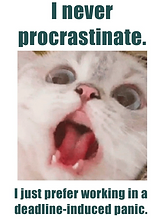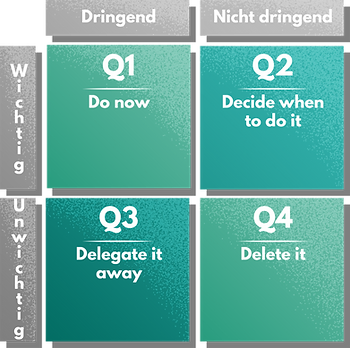
Der Spiegel recently reported on the “Manuscript Writing Cafe” in Tokyo. A café that guests are only allowed to leave when the work is done. The purpose is not to give in to procrastination and to actually complete upcoming tasks. The coffee helps. It's a strange business model, because procrastination is something that only affects writers and students, but not us in everyday working life. We're all so dynamic and motivated — aren't we?
Speaking between us, it's still really cool to study until 3 o'clock in the morning and then show up for the exam with several Red Bull cans. But somehow not in professional life.
We should be honest with ourselves: We all lack motivation for certain tasks and keep coming up with new reasons why we can't complete the task right now. Or rather: 1000 other things that absolutely must be done beforehand. Working from home doesn't make things any easier, because the distraction is hidden around every corner. Procrastinators worldwide can certainly sing a song about this. The conflict between “I know I should actually do that now” and “Look! A little raccoon with bibs eating cherries. I love raccoons! ”
Looked at this way, procrastination sounds funny, of course — And the more memes When you look at it, the funnier it is. That is only human, after all, we are not machines.
In an increasingly performance-oriented working world, this often seems to be the general perception of procrastination. However, it is not that simple, as studies also suggest:
Procrastinators fail in setting standards, monitoring performance, and maintaining motivation. [...] In other words, procrastination functions as an emotional regulation strategy in order to mend the bad moods caused by the task at hand.

The whole thing therefore does not necessarily have to do with laziness; procrastinators rather suffer from self-regulation problems. It is not for nothing that many feel burdened by their own procrastination, because it is not listlessness, but the difficulty of starting to become active. Procrastinators know that they should now focus on their work to avoid future problems — but then they do something else.
Tim Urban, blogger and Ted Talker, for example, explains the whole thing using a powerful example. In short: The brains of procrastinators differ significantly from that of non-procrastinators. The Rational Decision Maker (RDM for short) is at the helm of all our mental processes. Through him, we are able to make logically motivated and reflected decisions. Procrastinators, however, have another figure in their heads: The Instant Gratification Monkey, which throws the qualities of RDM out the window in order to follow its own mantra: Easy and fun! This poses two problems
It goes without saying: The Instant Gratification Monkey is not a good guide. He lives completely in the present and has neither an eye for the future nor a sense of consequences.
Before you know it, the deadline of four weeks ago is getting closer and closer, reduced to two weeks, one — three days. That's when the last member of the procrastination mechanism awakens: The Panic Monster. In its entirety, the process then looks something like this:
“... we still have three days 😬,” says the Rational Decision Maker.
“We still have three days! 🍌🐒” says the Instant Gratification Monkey.
“#@%$ WE STILL HAVE THREE DAYS LEFT!!! 💢😡” the panic monster screams — and the monkey disappears onto the tree, allowing the RDM to take control and start working.
According to Urban, the panic monster explains a lot of dubious behavioral patterns — above all how procrastinators manage not to write a single line for more than three weeks, for example, but then work through them all in one go within one night, without sleep and with the help of around 400 mg of caffeine. Not a nice system, but in most cases it works somehow.
Science also agrees with Urban. Zhang and Co. For example, their study found that tasks are primarily postponed when...

In other words, setting priorities is not exactly a strength of procrastinators. Difficulties that can definitely be addressed — for example via the Eisenhower Matrix: A system for productivity regulation that aims to set the priority of tasks using four quadrants. This allows tasks to be classified according to their urgency and importance. Those that are in Q1, for example, have both high urgency and great importance and should therefore be dealt with first.
Even though it won't be easy for procrastinators not to complete Q1 as soon as the deadline comes unpleasantly close that it's already causing sweats, you can still cut a slice of Eisenhower. More tips to help us
These methods could help you curb your inner monkey a bit:
Of course, procrastination cannot be defeated with a single blog post. It would be nice. So back to work!
We need to think about what we're really procrastinating on, because everyone is procrastinating on something in life. We need to stay aware of the Instant Gratification Monkey. That's a job for all of us. And because there's not that many boxes on there, it's a job that should probably start today. Well, maybe not today, but... you know. Sometime soon.
- Tim Urban
For further reading:
Do you have a question or would you like to find out how we can work together?
Feel free to contact us here or via linkedin with us — we'd love to hear from you